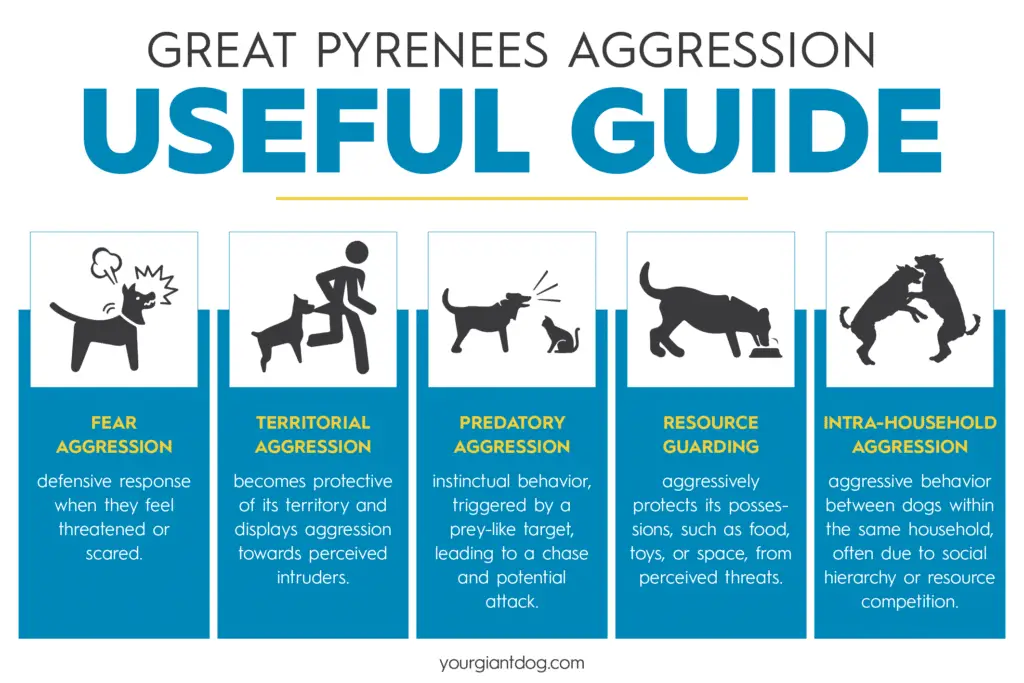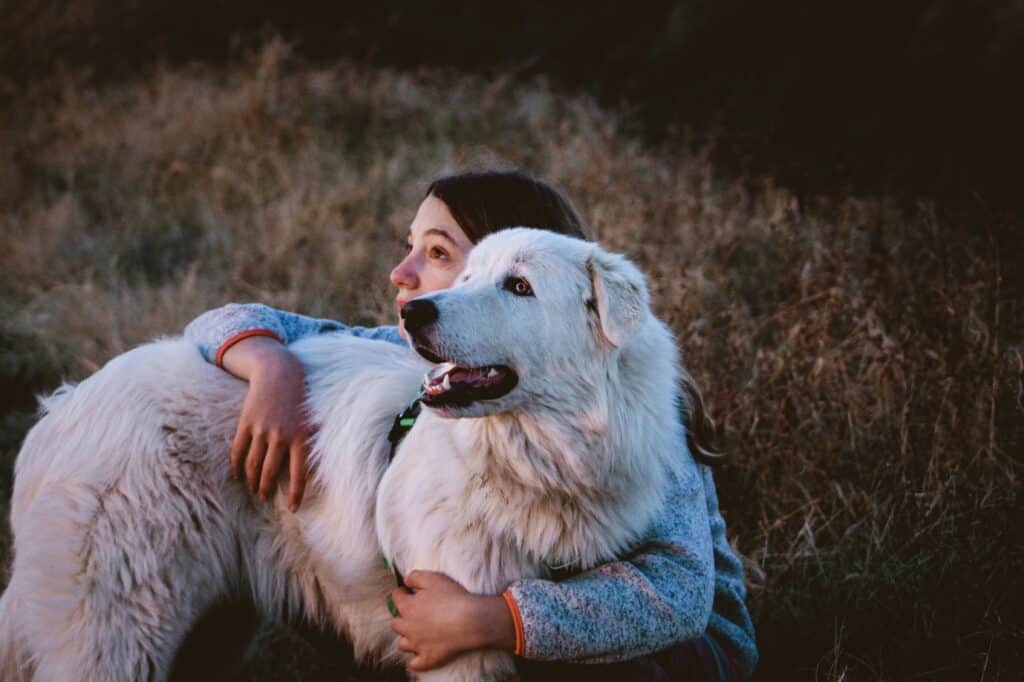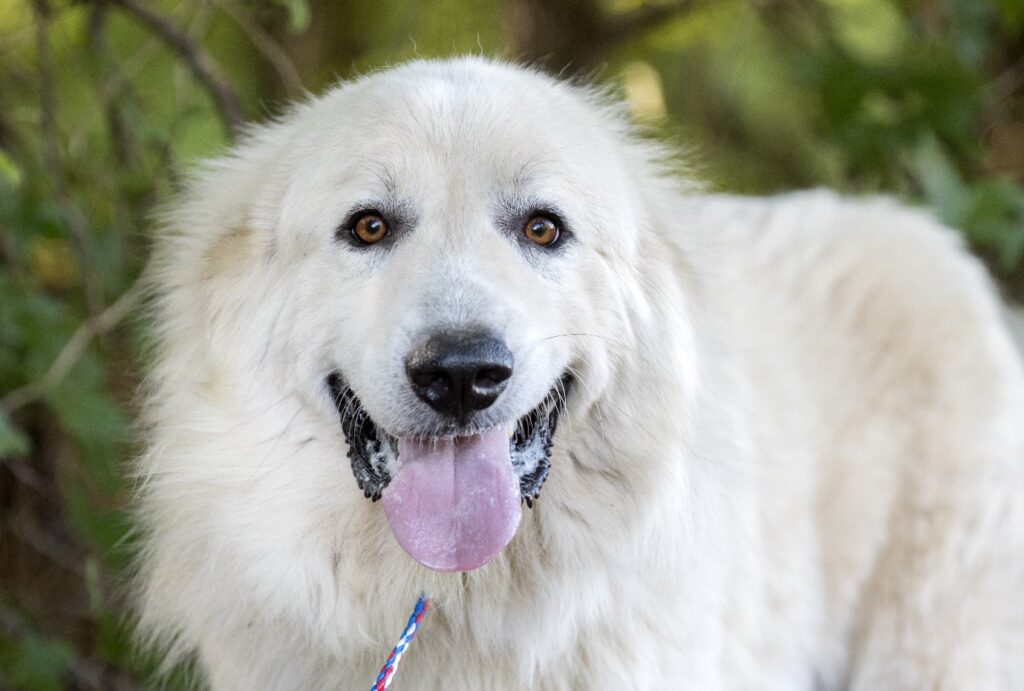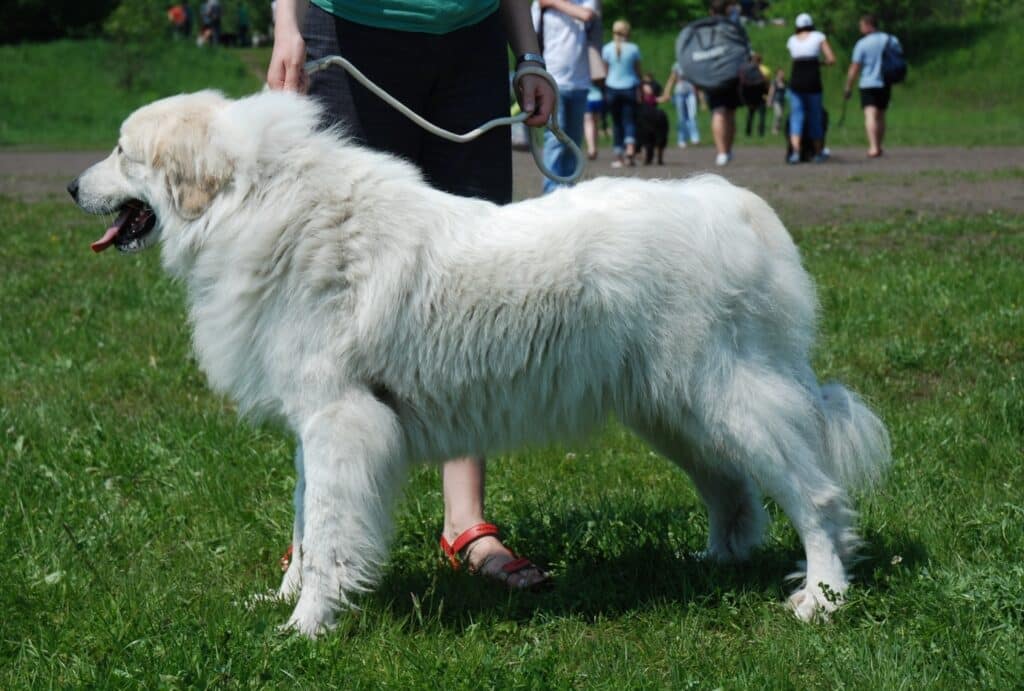The Great Pyrenees is a gentle giant known for being calm, loving, and protective. However, some people believe that they can be aggressive.
So, what is the truth? Are the Great Pyrenees aggressive, or are they just big softies? Read on to find out!
Why Are Great Pyrenees Aggressive?
There are a number of key reasons that trigger the Great Pyrenees aggressive behavior; we explore these below:
Fear Aggression
The Great Pyrenees is a gentle giant, but even the best-tempered dog can lash out in fear. When a Great Pyrenees feels threatened, it may show aggression as a way to protect itself.
This can be a problem if the dog is not properly socialized and may trigger Great Pyrenees aggressive behavior.
Fear aggression is one of the most common problems seen in the Great Pyrenees. It is important to recognize the signs of fear aggression and to socialize your dog from an early age.
With proper training and management, you can help your Great Pyrenees live a happy and healthy life.
Territorial Aggression
While the Great Pyrenees are large, gentle giants, they can sometimes display territorial aggression.
Territorial aggression in the Great Pyrenees is characterized by the dog feeling the need to protect its home and family from perceived threats.
This can manifest itself in a number of ways, such as barking excessively at strangers, growling or snapping at people who come too close, or even biting if the person does not back off.
“While this behavior may seem scary, it is actually quite common in Great Pyrenees and is usually not indicative of any serious underlying issues. In most cases, territorial aggression can be managed with proper training and socialization”.
Predatory Aggression
Predatory aggression is a serious problem in Great Pyrenees. It is characterized by a dog exhibiting unprovoked, often violent behavior towards humans or other animals. This type of aggression can be extremely dangerous and is often difficult to change.
There are several possible explanations for predatory aggression in Great Pyrenees. One theory is that it is innate, meaning that it is something that the dog is born with and cannot be changed.
Another possibility is that it develops due to environmental factors, such as lack of socialization or exposure to violence. Regardless of the cause, predatory aggression can be a very serious problem.
If you suspect that your dog may be exhibiting this behavior, it is important to seek professional help immediately. This can be extremely dangerous and should not be ignored.
RECOMMENDED – The Ultimate Great Pyrenees Guide – All Questions Answered!
Resource Guarding
Great Pyrenees are very loyal and protective dogs. They were originally bred to guard sheep and other livestock against predators such as wolves and bears. Today, they are still used for guarding, but they also make great family pets.
The Great Pyrenees are gentle giants who love to cuddle and play with their human families. However, they can sometimes display resource-guarding behavior, where they become very territorial over their food or toys.
Resource guarding is a natural behavior for Great Pyrenees, but it can become a problem if not properly trained.
If you are thinking of adding a Great Pyrenees to your family, it is important to understand resource guarding and how to train your dog to prevent it from becoming an issue.
Intra-Household Aggression
Intra-household aggression can be a problem in any home, but it is especially an issue in homes with Great Pyrenees. These dogs were bred to be guardian dogs, and as such, they are very protective of their families.
This protectiveness can sometimes lead to aggression towards other members of the household, particularly if the dog feels that someone is a threat to its family.
There are several things that you can do to try to prevent intra-household aggression in your Great Pyrenees. First, make sure that everyone in the family is on the same page when it comes to rules and expectations for the dog.
Everyone should be consistent in their commands and discipline so the dog knows what is expected of it. Secondly, provide plenty of exercise and mental stimulation for your dog.
A tired dog is much less likely to be aggressive. Thirdly, don’t encourage the dog to become possessive of its toys or food. If the dog is possessive of its toys, then someone may get bitten when the dog takes a toy from him or her.
“Additionally, Great Pyrenees are large dogs with a lot of power and energy. If they aren’t properly socialized or trained, they may become overly excited or anxious, which can lead to aggressive behaviors”.
Finally, some health conditions can cause aggression in dogs, so it’s important to rule out any medical causes if your dog is exhibiting this behavior.

Are Great Pyrenees Aggressive to People?

No, the Great Pyrenees are not aggressive to people. In fact, they are known for being gentle giants. They were originally bred to be working dogs, and their calm and patient demeanor make them great companions.
However, because of their size and strength, they need to be properly trained and socialized from a young age. Without proper training, they can become too protective of their family and territory, which can lead to aggression.
“If you have a Great Pyrenees, it’s important to train the dog from a young age. This will help ensure that your dog is well-behaved and gets along well with everyone in your family”.
Are Great Pyrenees Considered Dangerous?
No, the Great Pyrenees are not considered dangerous. However, they are a large breed of dog and should be treated with caution. They were originally bred to guard sheep and other livestock, so they have a natural instinct to protect.
This means that they may be more aggressive towards strangers than other aggressive breeds of dogs. If you have a Great Pyrenees, it is important to socialize them from an early age so that they know how to interact with people in a non-threatening way.
The Great Pyrenees is a dominant breed and may show undesirable behavior if they are not trained properly. They should also never be left alone with children, as they may accidentally step on them or knock them over while playing.
Are Great Pyrenees Dominant Dogs?
There are a lot of misconceptions about the Great Pyrenees dogs. One of the most common is that they’re dominant dogs. This couldn’t be further from the truth! The Great Pyrenees are actually very gentle, loving, and loyal companions.
“Sure, they may have a regal bearing and look like they could take charge if they wanted to, but that’s just not in their nature. These dogs are content to lounge around the house all day and cuddle with their favorite humans”.
Should I buy a Great Pyrenees Dog?
If you’re looking for a laid-back, easygoing dog who will be your devoted friend for life, a Great Pyrenees is the perfect choice for you. If you’re considering adopting a Great Pyrenees, here are some things to keep in mind.
1. They’re very low-maintenance dogs. Aside from their daily walks (which are more like strolls), Great Pyrenees are very low-maintenance dogs. They don’t need to be taken to the groomer every month, and they only need a bath about once or twice a year. They shed, but not nearly as much as some other breeds of dogs do. They’re also fairly quiet and will rarely bark.
2. They’re very independent. The Great Pyrenees are used to being outside all day, so they don’t need a lot of attention from their human companions. They’re very independent and don’t need a lot of attention.
3. They’re gentle with children. They originated in France, so they’re used to living with families and being around children. They’re very gentle and playful.
4. They’re very protective. They are a very protective breed of dog, which makes them excellent guard dogs. They don’t bark unnecessarily, but they will let you know when someone’s approaching your home or yard.
5. They’re smart. The Great Pyrenees are very intelligent dogs and make great family pets. They learn quickly and are eager to please their owners.
6. They’re very beautiful. The Great Pyrenees has a long and thick white coat, which gives them a regal appearance.
Will the Great Pyrenees Protect Me?

Yes, the Great Pyrenees will protect you. They are bred to be loyal, gentle guardians and will form a close bond with their families.
They are naturally suspicious of strangers and will bark to warn you of any potential danger. With their size and strength, they make an excellent deterrent against would-be intruders.
Will a Great Pyrenees Attack an Intruder?
No. The Great Pyrenees is not an aggressive dog breed and is not likely to attack an intruder. However, they are large, protective dogs who will bark and deter intruders. They make great guard dogs and are loyal to their family.
If you want it to attack intruders, you will have to train it to do so. However, other dogs like the Pitbull and the German Shepherd are more likely to attack intruders.
How to Manage the Great Pyrenees Aggressive behavior?
The Great Pyrenees is a gentle giant, but even the most docile dog can have moments of aggression. Here are some tips on how to manage an aggressive Great Pyrenees.
Early Training is a Must
There are few dog breeds as noble and beautiful as the Great Pyrenees. These gentle giants were bred to protect flocks of sheep from predators in the mountainous regions of Europe, and they take their jobs very seriously.
If you’re thinking of adding a Great Pyrenees to your family, be prepared for a lot of training. These dogs are intelligent and independent, and they need firm, consistent leadership to thrive.
Early training is essential for the Great Pyrenees. Like all dogs, they need basic obedience training, but they also require socialization to get used to other animals and people.
Without early training and socialization, Great Pyrenees can be reserved and even aggressive around strangers. They also have a strong prey drive and may not do well around small pets unless they’re taught to respect them.
Keeping in mind, that teaching your dog new behaviors can happen quickly and easily by utilizing some clever online training options.
The training listed below is what we highly recommend for quick and lasting results!

Regular Exercise
The Great Pyrenees is a large and active dog breed that requires plenty of exercise to stay healthy and fit. A regular exercise routine is essential for keeping your Great Pyrenees in top shape, both physically and mentally.
There are many different ways to exercise your Great Pyrenees. Some of them include;
Walks
Walks are an excellent way to keep your Great Pyrenees in shape and happy. Even though this is a large breed, they tend to have a good amount of endurance, so walks can last longer than you might think.
Make sure to keep them on a leash so they don’t wander off and that you are controlling their movements. Walks are important because they not only give your Great Pyrenees exercise, but also help strengthen the bond between you and your dog.
Runs
Another great way to exercise your Great Pyrenees is to go on runs with them. Make sure to run alongside them and not in front of them – you don’t want to accidentally trip over your dog!
This is a great way to get them in shape and keep them happy, plus it helps strengthen the bond between you and your dog.
Swimming
If you have a pool or a lake nearby, this is one of the best ways to exercise your Great Pyrenees. A lot of dogs love to swim because it’s a fun activity and it’s also a great way to exercise.
If your dog is not used to swimming, you should get them accustomed to the water before you take them in – this will make sure they don’t panic and hurt themselves.
Hikes
If you live in an area where you can take your dog on hikes, this is a great way to get them some exercise. You should not let your dog off the leash unless it’s safe to do so – they could run into traffic or other dangerous scenarios.
Playing Fetch
If your Great Pyrenees loves playing fetch, this is a great way to get them some exercise. Make sure you are prepared to throw the ball for them for a long time, as they may enjoy it more than you do!
“Whatever type of exercise you choose for your dog, make sure to start slowly and gradually increase the intensity as they get used to it. You should also make sure to provide plenty of water breaks during any strenuous activity”.
Mental Stimulation
The Great Pyrenees is a large, playful dog breed that requires plenty of mental stimulation. Without it, they can become bored and destructive.
There are a number of ways to keep your dog’s mind active, including obedience training, puzzle toys, and nose work games.
Obedience Training is a great way to mentally stimulate your dog. It not only keeps their mind active but also helps them to bond with you and learn new things.
Puzzle Toys are another excellent way to provide mental stimulation for your dog. They help to challenge their problem-solving skills and keep their minds active.
Nose Work Games are also a great option for mental stimulation. These games involve your dog using its sense of smell to find hidden objects or treats. They’re lots of fun for both you and your dog, and they help to keep their minds sharp.
Regular Socialization

The Great Pyrenees is a loyal and gentle giant, making them a great family pet. However, they are also a working dog breed and need regular socialization in order to stay happy and healthy.
Without socialization, a Great |Pyrenees aggressive behavior is likely, due to anxiety and discomfort around other animals and people.
Here are some tips for socializing your Great Pyrenees:
1. Start early. The earlier you start socializing your puppy, the better. This will help them get used to different people, places, and situations.
2. Be consistent. It’s important to be consistent when socializing your dog. This means taking them to meet new people and places on a regular basis.
3. Be patient. Some dogs take longer than others to warm up to new people and situations. Don t push them, and don t get frustrated.
4. Use positive reinforcement. This means rewarding your dog for good behavior instead of punishing them for bad behavior.
5. Keep it fun. If your dog is having a good time and wants to keep playing, then let them! Your Great Pyrenees will learn much faster if they’re having fun.
6. Stay calm. If you’re stressed, your dog will pick up on it and get nervous too.
7. Be a role model. If you want your dog to be calm and well-behaved, then act like one yourself!


